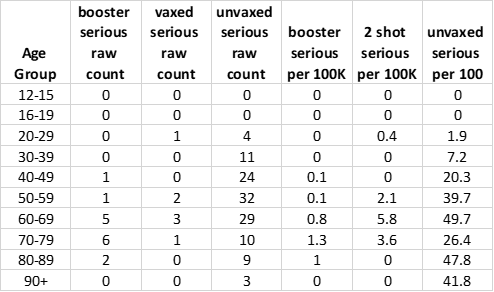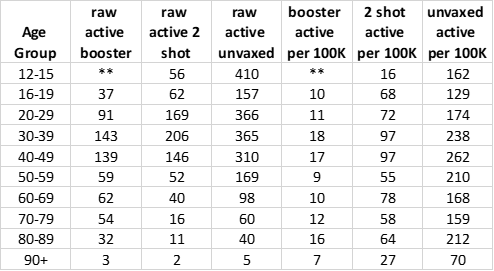Why am I getting a booster?
November 15, 2021 By Alan SalzbergChances are, I will not get very sick from Covid. I've gotten two shots of the Pfizer vaccine. Vaccinated people who are in my age group (50-60) had about a 1 in 50,000 chance of death in the recent very serious outbreak in the US in which more than 100,000 people a day were getting Covid and around 2,000 were dying every day (see my previous blog post for details here). Even in such an outbreak, Covid was not quite as bad as a bad flu year. Also, my older relatives and acquaintances already have boosters, meaning I would have little chance of giving them serious Covid (with a booster, Covid is less risky than the flu for them, but not without).
So why bother? Well, a substantial number of people who are vaccinated will likely get Covid this winter (all trends are pointing to this), and, if I can substantially guard against even minor infection, and have a small chance of preventing other people from getting infected, then why not?
Let's look at the data to chase down these chances. We now have more than 2 months of booster data in Israel, so we know the booster effect does not immediately wane (though it could later on), so we can figure a booster now is good for at least a couple of months.
First, let's look at serious infections, where, as you can see, the booster does make a difference, but rates are tiny either way. Below is current data on the raw number (and rate per 100,000 people) of serious Covid with the booster, 2 shots of Pfizer, or no vaccine (includes 1 shot, I believe), in Israel.

As you can see above, the booster helps, but in the case of serious Covid in my age group (and below), it goes from really really close to zero to really really really close to zero. Who cares? Not me.
Now let's look at infection. This means anything from a minor cold, which it mostly is, to being laid up with flu symptoms for several days. Here the risks are substantial without the booster. )Note that I believe 12-15 year olds are not getting the booster in Israel at this time, but the it's not totally clear from the data, hence the asterisks).

Here the risks are 55 per 100K (about 1 in 2,000) for vaxed versus about 1 in 10,000 for boosted (and 1 in 500 for unvaxed). If we take these chances as roughly weekly (these are current active cases), that amounts to chances of around 1 in 100 for vaxed in my age group and 1 in 500 for boosted across a 16 week winter season. If we have a bigger outbreak (say, twice as bad--which seems likely), it would be about 1 in 50 for vaxed and 1 in 250 for boosted (and maybe 1 in 20 or higher for unvaxed). So the chances still aren't very high, but I'm doing what I would do for the flu--getting a slightly inconvenient shot for a substantially smaller chance of a major inconvenient sickness.
Still, the argument for the booster for 60- is fairly weak. If you have a strong and bad reaction to the first two shots, it's quite reasonable to do without the booster (weighing, say, an 80% chance of a really crappy day from the shot to a 1 in 100 chance of a very crappy few days).
How about the argument that you are doing it for others? I think that's a good reason, but also the statistics show the unvaccinated have more than double the chance of infection in the first place and vaccinated people who get infected are not infectious for as long in the second place. So, the effect on others is there but it's not at the level it was when you weren't vaxed at all. A reasonable strategy for those who do not want or who fear a booster, but are in a relatively safe age group (60-), is to take a rapid test (now about $10 for an at-home version) right before seeing older or compromised friends or relatives.
So net net? I'm getting boosted, and it lowers your chances of serious and not serious disease, at least for awhile. But since they're already really low if you are vaxed and not old, I won't be judge-y like I was if you didn't get vaxed at all.